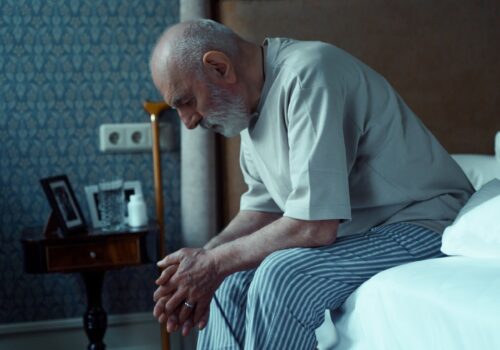Have you ever contemplated your existence? Have you ever pondered and felt curious about matters such as death and the purpose of life? Does the thought that life is uncertain, pointless, or has an inevitable end make you anxious? You aren’t alone; several people experience such thoughts arising from existential thinking, and the anxiety resulting from it is an existential crisis. So, how do you cope with an existential crisis? In this blog, we will attempt to understand existential thinking, the stress that comes with it, and ways you can deal with it.
What is Existentialism?
Life is a journey that often leads us to question the very essence of our existence. The thought process that leads to moments of intense introspection about one’s existence is known as existentialism.
Existentialism has undoubtedly been a part of human thought since humans learned to contemplate their existence. Still, awareness and acknowledgement of existentialism as a philosophy were put forth by Søren Kierkegaard, a Danish philosopher from the 1800s, now considered the father of existentialism. Kierkegaard believed that humans should find purpose and meaning in their lives instead of depending on religion. Kierkegaard also felt that such thinking could impact human emotion, causing anxiety from this process of self-discovery and contemplation of the meaning and importance of life. When you are unable to attribute any purpose to your life, when you begin thinking how life is pointless because of its uncertainty and that existence itself is meaningless, you are experiencing an existential crisis.
The Irony of Existential Thinking
An existential crisis is a journey of self-discovery that can haunt a person for life. Ironically, it can invoke a sense of mindfulness and an awareness of life itself and make one value life even when thinking how valueless and uncertain it might be. This contradiction was best explained by French philosopher, journalist, and author Albert Camus in his essay ‘The Myth of Sisyphus.” Camus’s philosophy is based on (existentialist) absurdism, which explains how humans drive themselves to find meaning in life, and when it doesn’t exist, we create it.
Camus’ absurdism approach states that human life is indeed meaningless, but to contemplate that meaninglessness is the first step to feeling alive. Camus feels meaninglessness is okay, and meaning can be created from something pointless. If life is pointless, if we view it as a problem, it’s just one more problem to solve. Surprisingly, Camus’ philosophy is not unlike mindfulness, a practice designed to live in the moment, to forget the uncertainty and the meaningless, and to value the state of being. Existential thinking is a complex phenomenon, and therefore extremely complex.
When Does an Existential Crisis Occur?
A variety of factors can trigger an existential crisis. These can often arise from introspection, personal experiences, and intense philosophical contemplation. An existential crisis’s specific causes and triggers can vary from person to person. Mentioned below are some possible reasons that lead to anxiety and existential crisis.
- Major Life Transitions: Significant life changes include graduating, changing careers, getting married, or becoming a parent.
- Mortality and Death: The death of a loved one or a near-death experience can lead to contemplating the uncertainty of life.
- Philosophical Reflection: Philosophical thinking triggered by existential literature can trigger the thought process to question the purpose of life.
- Loss of Belief Systems: The inability to derive spiritual sustenance from one’s religious, cultural, or ideological beliefs can trigger an existential crisis.
- Loneliness: Isolation, loneliness and depression can contribute to questioning the purpose of one’s existence in the world.
- Trauma: Past traumatic experiences, accidents, or encounters with death can also trigger existential thoughts.
- Midlife Reflection: contemplating one’s achievements after crossing middle age might trigger existential thinking fueled by a feeling of failure or no purpose.
Symptoms of an Existential Crisis
An existential crisis is also a type of depression termed existential depression. While some may reflect on the questions of existentialism to seek answers and derive positivity from it, others might just be influenced by the uncertainty of the same. In this adverse scenario, existentialism can lead to the following symptoms:
- Lack of motivation
- Fixated on thoughts of death
- Hopelessness
- Anxiety
- Depression
- The feeling of being overwhelmed
- Loneliness and Isolation
- Obsessive worrying
What Is Existential Therapy, and Does It Help?
Existential therapy was first conceived by German psychoanalyst Otto Rank who focused more on mindfulness and present feelings rather than delving into the subconscious, a typical strategy by psychoanalysts. Rank felt the key to tackling mental health issues was instigating positive ways of thinking and acting. In his work “The Art of Living” Rank states
Life lived fully — not avoided, but experienced with all its pain and joy, and despite its limitation in death — is the ultimate creative act
Existential anxiety results from uncertainty and a change in the perception of life, one’s existence, and the world. Existential therapy then attempts to help those with existential anxiety confront their issues and acknowledge the fears and phobias of death, poor decision-making, and their perception of a meaningless life. In this regard, the philosophy of Camus can play a positive role in helping people understand the inevitable and why focusing on mindfulness can be a support mechanism to overcome anxiety.
Because existential crisis and existentialism itself is so complex, therapy itself requires more research to develop a suitable therapeutic model to address the concerns of individuals. While existential therapy focusing on meaning can help, it has proven ineffective to influence well-being.
Tips on Coping With an Existential Crisis
Self-Awareness and Mindfulness
All humans are capable of self-awareness, and mindfulness is a positive form of self-awareness that helps one value a present state of being. Reflect on what makes you feel good, and open your mind to absorb your surroundings rather than take them for granted. Take a walk in nature, a park, and take in sights and sounds you have never noticed before. Nature and greenery have been scientifically proven to induce calmness and help with anxiety. Practices like journaling and meditation can help you better understand your thoughts and emotions.
Connect With People to Learn About Your Uniqueness
Everyone is complex and unique, shaped by genetics, life experiences, environment, culture, and personal choices. Your uniqueness is who you are and that shapes your personality. Interpersonal relationships give you a social identity and a mirror through which to see yourself. Through the positive feedback of others, you gain insight into the various aspects of yourself that you might not have been aware of. One word of advice, though, is to learn to recognize toxic feedback and not allow it to dictate who you are.
Embrace the Absurdism of Existence
How often have you wondered why you think this way and yet others around you do not? Well, according to Camus, the search for meaning in life is an absurdity because this universe is an incomprehensible one. As much as we stress the desire for order, purpose, and happiness, the universe is indifferent and will not provide that. We make that for ourselves, and to do so, Camus says, we need to embrace the absurdity of human existence and create value, meaning, and purpose in it. Efforts and resilience, like the mythical hero Sisyphus – not suicide and despair – are the responses to an existential crisis.
Dealing With Death
The fear of death, or Thanatophobia is part of an existential crisis. While many psychotherapy treatments suggest CBT (cognitive behavioral therapy) and other strategies, there is no real solution except willful management. CBT also gives you techniques to manage better how you react to thoughts of death, such as deep breathing, but beyond such practices, it is your mindset which will help you deal with the fear of death. Psychologists prefer therapeutic techniques rather than the Camus way, but there is a lot of truth in what Camus says.
Camus suggests how the human spirit can find its form of meaning and defiance by living authentically in the face of the absurd. A rebellion of sorts, freedom from existential crisis is finding meaning to life in defiance of death and the universe’s indifference. Embrace that death is inevitable, which gives life meaning, so why waste time thinking of a future event when you have so much of the present to live in?
Be Compassionate
Compassion and empathy do not just benefit the receiver but the giver too. Explore how engaging in acts of kindness and contributing to the well-being of others can cultivate a profound sense of purpose and connectedness. Studies have shown how empathy and compassion increase feel-good hormones like oxytocin and dopamine.
Explore Personal Passions
One of the biggest triggers of stress and anxiety in today’s life is burnout and the absence of pursuing one’s passion or interests. Take time out to pursue a hobby or activity that you love. Hiking, travelling, and visiting a new place is a break from a stereotypical life. It is a massive reset and rejuvenating factor for your brain to focus on new things rather than indulge in the monotony of routine life, risking the negativity that could arise from it. Exploring interests, passions, and curiosities is critical to unlocking a more profound sense of purpose.
Conclusion
An existential crisis is a profoundly personal experience; people with high intellectual abilities are often more prone to it than others. In such a situation, it becomes difficult for such people to reach out due to the common mindset that wonders, “How can anyone help find an answer to death?” Look at it this way: perhaps an existential crisis never really goes away, but one can fortify their mind to contain the mental effects that arise from it. For this purpose, seeking support from mental health professionals, therapists, or counselors can be beneficial. Through positive thought strategies, one can even turn an existential crisis into an opportunity for personal growth, self-discovery, and a deeper understanding of oneself and the world.
















